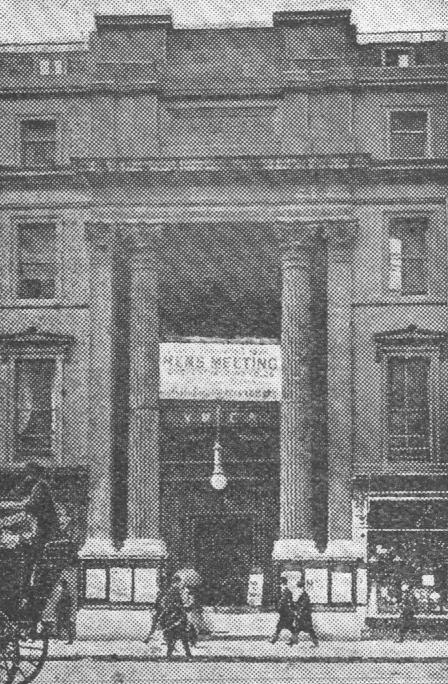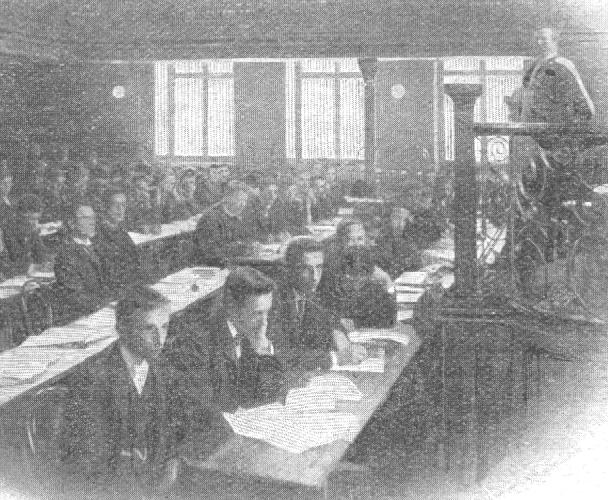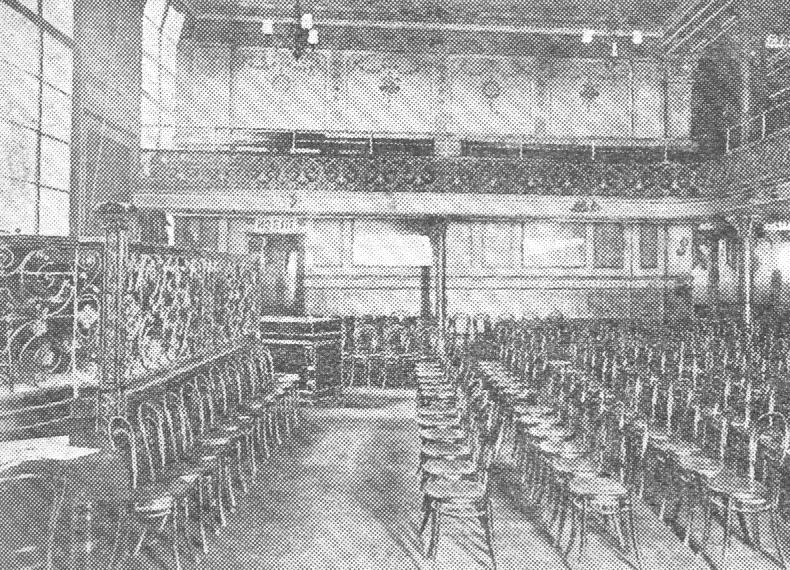
|
 Time Line
Time Line
|


|
Exeter Hall, The Strand, London, 1831-1907
Disappearing London
The Passing of Exeter Hall
by Percy Howard.
May 1907: (Volume 13, Number 5)
Dickens, in his sketch of "The Parish," describes how the Child's Examination Society had gained a momentary victory over the Bible and Prayer Book Distribution Society. A meeting of the latter was at once held to consider the best means of recovering its position, and " a sudden light broke upon the meet- ing when an old lady was heard to mumble in indistinct tones ' Exeter Hall.' Precisely what the old lady meant nobody knew," but it is a fact that the famous hall which is shortly to pass out of existence, has played a most important part in the history of the last seventy years. From within its walls our colonial and foreign policy has been influenced in no small degree. In the early forties, Exeter Hall was the centre of the anti-slavery campaign, and the example once set, its platform began to take into its particular care the cause of oppressed nationalities. Statesmen, weighing one policy against another, have had to ask " What will Exeter Hall say ?" The sentiments expressed within its walls were not to be despised, and a recent writer has said that " Exeter Hall" and " Cecil Rhodes " most fitly describe the opposing policies of this country.

[The picture appears to be from newsprint, and I would think it was a recent one in 1907] |
The ground on which Exeter Hall stands was formerly occupied by a menagerie, but, owing to the roaring of the lions frightening the horses in the Strand, it was cleared away in 1829. The need of a hall for religious work, which should also provide a home for the various organisations, had long been felt, and the site was at once acquired by a number of influential men for that purpose. On March 29th, 1831, in the presence of an immense audience, the first Exeter Hall was opened, Sir Thomas Baring being in the chair. It was considerably smaller than the present building, but cost, for those days, the large sum of £30,000. In 1850, various improvements 'were made, and the hall was lengthened.
Although essentially a centre of religious activity, Exeter Hall holds a unique place in the musical history of the last century. For many years it had been the custom to perform oratorios twice a week during Lent in the theatres of the metropolis, but these were given up when the new hall was opened, and it at once became the temple of music in London. Thither flocked great crowds to hear the fine band and chorus of 700 voices, conducted by Sir Michael Costa, while the appearance of Mendelssohn or Spohr to conduct their own compositions, drew the fashionable world to the Strand
The performance of oratorios ceased in the season of 1879-80, when they were. transferred to the Albert Hall. Mr. Hullah's famous "Musical Evenings " were also held in Exeter Hall, and the rehearsals for the Handel festival have continued to take place there.
The first temperance meeting was held on June 29th, 1831, and was one of the greatest on record. It was followed by a long series of others, and in 1853 the committee of the London Temperance League invited the famous orator, John B. Gough, to come over from the United States. On August 2nd of that year, a notable meeting was held at which he received a great reception. His power surpassed all expectations, and in the three visits he paid to England, he delivered, altogether, over 100 temperance addresses in Exeter Hall. Sir Wilfred Lawson's Local Option resolution in 1879 was also supported by a great meeting.
It was in Exeter Hall, in June, 1840, that the Prince Consort made his first public appearance in England, when he presided at a meeting for the abolition of the slave trade. His speech was most successful, and he wrote to his father that it was received with great applause, and seemed to have produced a good effect in the country. A few days later another famous meeting of the Anti-Slavery Convention was held, the venerable Thomas Clarkson, then in his 81st year, presiding. The meeting is the subject of the famous painting by Haydon, who has left on record a description of the gathering. Convinced that the scene would be of a commonplace character, he had gone unwillingly, but when Clarkson, in feeble voice, appealed to the vast assembly for a few minutes meditation before opening the convention. and "put his hand to his forehead as if in prayer, the whole assembly following his example. It was the most intense silence I have ever felt."
Then Clarkson spoke to the people, and the painter continues
"Never did I witness in life or in drama so deep, so touching, so pathetic an effect produced on any great assembly as by the few unaffected, natural, and honest words of this aged and agitated person... I was so affected and astonished that it was many minutes before I recovered sufficiently to perceive that the moment I had longed for had come to pass - and this was the moment I immediately chose for my picture."
From 1845 to 1865 the Y.M.C.A lectures were delivered in the Hall, but in 1880 it became the property of the Association, five friends putting down £5,000 apiece for the purchase. The building was then re- modelled and enlarged, the total outlay being close on £60,000. On March 29th, 1881, the jubilee of the structure, it was re-opened by Lord Shaftesbury. Since then many famous meetings have been held within its walls. Stanley's first lecture on his return from the Congo expedition was given here, and in March, 1895, members of the Royal family were present to hear F. C. Selous lecture on "Travel and Adventure in South East Africa." "Imperialists" who are accustomed to sneer at " Exeter Hall," should remember that it was "Exeter Hall" that saved Uganda for the British Empire. It was stated at a meeting of the Church Missionary Society that the British East Africa Company, in consequence of their failure to secure a parliamentary grant for survey, intended to withdraw their representative, Captain Lugard, and that this could only be prevented by the guarantee of a sum of £40,000. An appeal was made to the meeting. One friend offered £5,000, another four freehold plots of ground, another a bag of rupees, another a gold watch. Within seven days £11,000 had been given or promised. Captain Lugard was instructed not to retire, and Uganda was finally secured to the Empire when Parliament in the following March voted £20,000 for the railway survey.
Many a great name is recalled by the old platform chair, which is still preserved. Brougham, Guizot, Moffat, Livingstone, Shaftesbury, Clarkson, Wilberforce - have all "taken the chair " at Exeter Hall, while Mr. Gladstone and Lord Salisbury appear in the list of famous speakers.
The great organ has been bought by the people of Ipswich for £1,8oo, for erection in their public hall.
Headings




 Click coloured words to go where you want
Click coloured words to go where you want